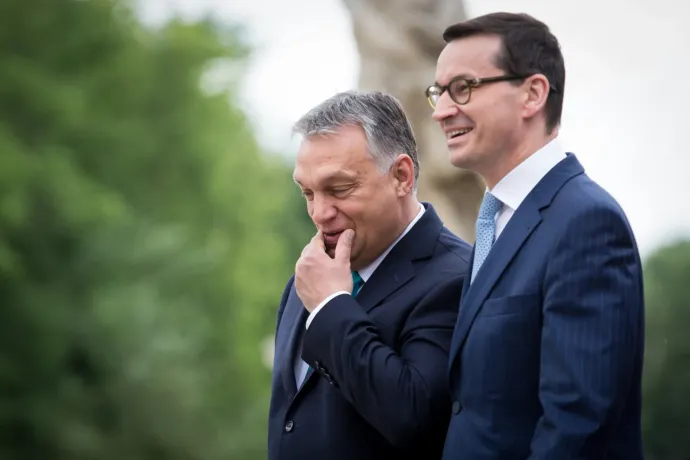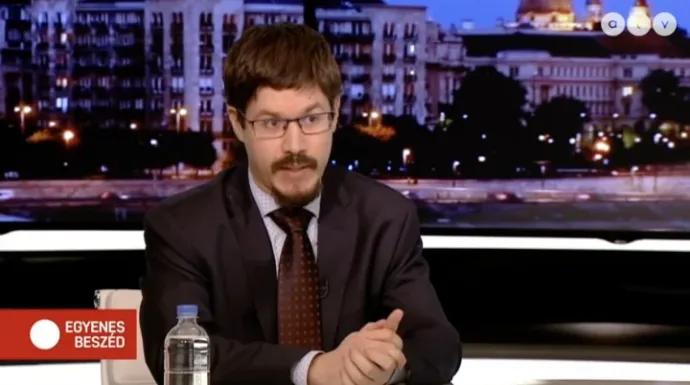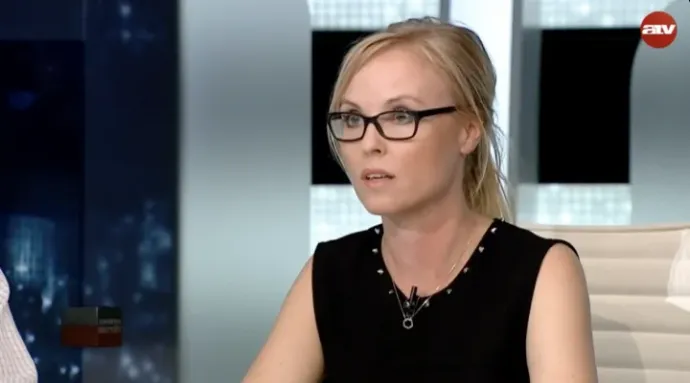
The Russian-Ukrainian war could bring about a serious shake-up in Hungarian-Polish relations: in the near future, the "two good friends" may only join forces on a tactical level to get EU funds.
This may be a brief summary of the event put on by Eötvös Group on Wednesday afternoon in Budapest, where Poland expert Zsombor Zeöld, and political scientist Edit Zgut-Przybylska, gave a presentation on the politics of the two illiberal states and the relationships between them.
Both researchers live in Warsaw, so they have experienced first-hand how the Poles' attitude towards Hungarians has changed. They also showed how illiberalism in Poland differs from illiberalism in Hungary, and where the Warsaw and Budapest governments will continue to fight hand in hand despite their differences over Ukraine.
War could make Warsaw a ‘middle power’
Zsombor Zeöld began his presentation by outlining the Polish political situation: compared to the Hungarian situation, the position of the President of the Republic is stronger, but there is also an opposition of a mixed ideological spectrum against the right-wing populist governing party. On fundamental foreign and security policy issues, however, both political sides agree: the United States is an ally, Ukraine must be supported, and Russia is a threat.
Of course, the governing Law and Justice Party (PiS) controls the political agenda just as Fidesz does, but they too are facing rising inflation and soaring energy prices. "This country also experienced hyperinflation and was very exposed to debt because of Swiss franc loans, so they have a strong social experience of economic crises," Zeöld said.

As well as the crisis, Ukraine is just as important a factor in Polish politics: "For Poles, the war started in 2014, and this year's escalation is just a continuation of that.
Nowhere in Poland, at any level, is there any question of taking a bite out of Ukraine. Taking territories and redrawing the Polish-Ukrainian border are all part of Russian disinformation – and this is also being spread by Russian propaganda tools here, in Hungary."
– Zsombor Zeöld said. He said Warsaw sees the war as an opportunity to become a European 'middle power' with external help – the support of the United States. "This country is too big for central Europe, as it is much bigger in terms of territory and population than the Czech Republic, Slovakia and Hungary combined." Poland's geopolitics is preparing for a Cold War situation because of the Russian threat, which includes defending and diplomatically supporting Ukraine – but the close maritime cooperation with NATO is just as much a part of it, or even building relations with Romania, Turkey and South Korea.
Poland has also developed self-propelled guns in cooperation with the latter, for which Ukraine could be a potential market. The Polish defence industry is now receiving exceptional funding, according to Zeöld, which will help to increase defence spending to 4.2 percent of GDP this year. "This may drop a little next year, but it will still be well above the NATO target of 2 percent in 2023," Zeöld said.
But standing up for the Ukrainians could also lead to social tensions in the unfolding economic crisis, according to him: "We are talking about 1.5-2 million Ukrainian refugees who need to be provided with jobs – and although society is supporting the Ukrainians, the initial solidarity is fading. At the local level, there may also be problems with the integration of Ukrainians. And this could create a trap for PiS, which is why they are trying to move actively in the domestic and foreign policy space as well."
While bilateral relations would be strengthened by the government in Warsaw, cooperation with the Visegrád Four would be "scaled down", according to Zeöld. Indeed, some domestic political commentators suggest the government should make it clear that the EU should not confuse Polish and Hungarian rule of law issues.
Corruption, buying votes, media
But there are serious problems with the rule of law in both countries – Edit Zgut-Przybylska outlined in her presentation. According to her, although there are similar instruments of informal power in both Hungary and Poland, the institutional differences between the two countries are huge.
"While in Poland it was mainly the courts that were attacked – where independent judges were replaced in the framework of "decommunisation" – in Hungary all democratic institutions were moulded in the image of the regime. The Hungarian government has also curbed the power of NGOs and independent media through various NGO laws and the state propaganda machine, but the Polish government has failed to do so because of its less centralised system."
– Zgut-Przybylska said. In addition, she said, while the Hungarian government has been a steamroller in unlevelling the political playing field by rewriting the rules, the Polish government is constrained by more checks and balances. One of them is PiS presidential candidate Andrzej Duda, who has vetoed an increasing number of government laws since his second term in office started in 2020, including most recently the media law targeting US-owned TVN.

According to Zgut-Przybylska, although informal exercises of power are present in all countries, in Hungary and Poland they take the form of phenomena such as patronage and corruption. The legacy of the Soviet communist regimes, for example, and the process of accession to the European Union have just made matters worse: "Although both countries have met all the formal criteria of the Maastricht criteria, the EU has not examined the practical implementation of the criteria," she said.
Zgut-Przybylska used three examples to show how the Hungarian and Polish illiberal powers are making the political terrain unequal:
- Corruption: in Hungary, a small, identifiable group around the Prime Minister wins a large share of public procurements, making competition between resources unequal. In Poland, on the other hand, the ruling party tends to include state-owned companies or use state funds for political purposes through special foundations.
- Clientelism: in Hungary, the phenomenon of vote-buying is spectacular, she cited the 8th district of Budapest as a laboratory for this, where she said vulnerable communities are intimidated into voting for the ruling party. In Poland, votes are bought by handouts rather than coercion, but the church also plays an important role in supporting the ruling party.
- Media: In both countries, the capture of the media is an important tool for consolidate power. While in Hungary the Central European Press and Media Foundation is the most prominent example of this, in Poland an increasing number of rural media are being bought up through state-owned companies.
Zgut-Przybylska summarised the main difference between Hungarian and Polish illiberalism as follows: while in Hungary the system is organised around one person (Viktor Orbán), in Poland party loyalty (to Law and Justice) dominates, and the economy is much more autonomous. Although she says that the European Union is trying to fight illiberal regimes, "creative legislative compliance will not be able to overcome authoritarian regime change in practice".
"This is something the EU must take into account not only for Poland and Hungary, but also for the Western Balkan countries that want to join."
– she added.
Hungarian wines off the shelves
Answering questions from the audience, Zsombor Zeöld explained that the war in Ukraine has put Hungarian-Polish relations in a serious situation, not only politically but also socially:
"This is more than just outrage. It's outrage across the whole society: some Hungarian-related events are harder to organise now than they used to be, and even Hungarian wines have been taken off the shelves of some chain stores."
– the Warsaw-based expert said.
According to Zeöld, Polish society's image of democracy is also healthier, because while in Poland freedom goes hand in hand with responsibility, "this is not necessarily the case in Hungary, where the Kádár system is still alive in people's minds".
And this responsibility also means activism, according to Edit Zgut-Przybylska: "The local autonomous communities that have unfortunately disappeared bit by bit in Hungary are present in Poland. NGOs are strong and there are many local initiatives that seek to undermine the toxic political approaches of the governing party."
True, trust in democratic institutions in Poland is low, just as the social response to corruption has "cynical overtones" sometimes – i.e. Poles can be permissive in some instances.
According to Zgut-Przybylska, the Polish and Hungarian governments remain in a defensive alliance against the European Union when it comes to EU funds. Although the European Commission has only launched a rule of law mechanism against Hungary, Poland's EU funds are also being blocked, for the time being, prompting Warsaw to renew its campaign against Brussels.
However, because of the issue of Ukraine, other cooperation between Budapest and Warsaw is hardly conceivable in the future: "They are testing society to revive the V4, but if the PiS voters do not react well to this, the process could backfire."
And support is a sensitive issue for Law and Justice, as next year elections will be held in Poland: "The opposition has announced that they will run together, excluding the far right, but they cannot respond to the problems of society in a meaningful way, they have no viable alternative to the solutions of the ruling party. And although PiS fears that it will have to reach out to the far-right voter base, it will push polarisation to its peak during the campaign," says Edit Zgut-Przybylska.
For more quick, accurate and impartial news from and about Hungary, subscribe to the Telex English newsletter!
The translation of this article was made possible by our cooperation with the Heinrich Böll Foundation.